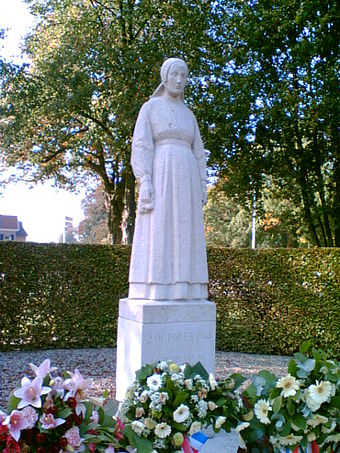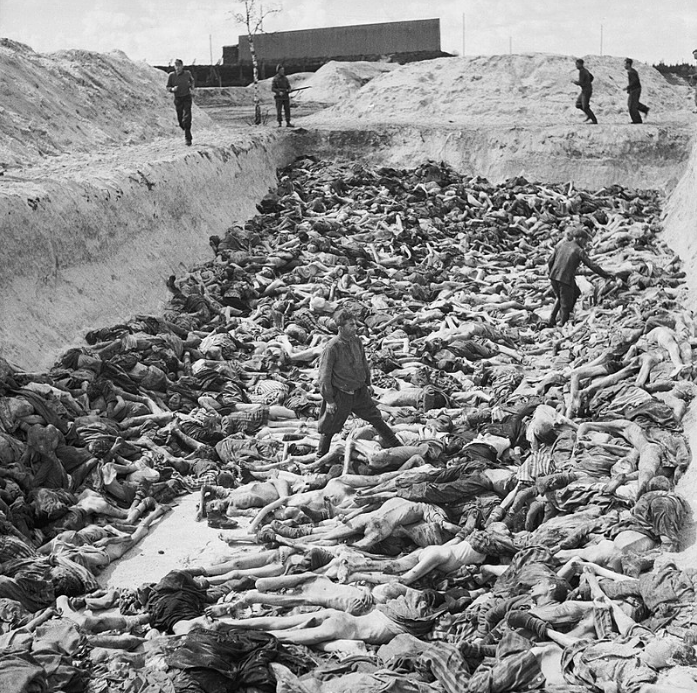
|
|
And I think to myself ... 1
... what a world! 3 Friedrich Christiansen was the Supreme Commander of the German Wehrmacht in the occupied Netherlands, during World War II. In October 1944, he ordered a raid on the village of Putten in retaliation for the ambushing by a Dutch resistance group of a car whereby a German officer was killed. More than a hundred houses were burned down, women and children were herded into a church, and 661 men between the ages of 18 and 50 were taken to a concentration camp. Below are the tabulated statistics of their fate: 5
The men were transported to a concentration camp near the Dutch city of Amersfoort where 59 of them were released because of typhus. The others were sent on to the German concentration camp Neuengamme. Thirteen of them somehow managed to jump off the train. Six men and a woman were shot during the raid. I have been told that men were lined up against a wall and then every other one shot while women were made to watch. Etc. I found that tabulation on a Wiki about Putten. It is followed by a brief sketch of the village's current economy: 7 "Today agriculture is still important in Putten, but the service sector now predominates. There are considerable numbers of shops, and tourism is important. Tourists are attracted by the varied landscape and the beach at the Ring Lake (Strand Nulde). Every Wednesday there is a produce and food market that is the biggest in the northwest Veluwe area." 8 In 1948, Christiansen was sentenced to 12 years imprisonment for war crimes. He was released three years later. His place of birth renewed an honorary citizenship and renamed a street in his honor. Objections arose in Germany and The Netherlands and the honors were revoked in 1980. Christansen couldn't have cared less; he had died in 1972. 9 What are 552 men compared to the more than six million Jews exterminated by the Nazis and their collaborators and the five million other victims of the Nazi holocaust? Include the lives lost by Axis and Allied troops, include civilians and the guestimate runs to 70–85 million people. 10 * * *
I'll quote an opening paragraph from "Trading with the enemy" (1983) by Charles Higham:. 11 "On a bright May morning in 1944, while young Amricans were dying on the Italian beachheads, Thomas Harrington McKittrick, American president of the Nazi-controlled Bank for International Settlements in Basle, Switzerland, arrived at his office to preside over the fourth annual meeting in time of war. The polished American gentleman sat down with his German, Japanese, Italian, British, and American executives to discuss such important matters as the $378 million in gold that had been sent to the Bank by the Nazi government after Pearl Harbor for use by its leaders that had been looted from the national banks of Austria, Holland, Belgium, and Czechoslovakia, or melted down from the Reichsbank holdings of the teeth fillings, spectacle frames, cigarette cases and lighters, and wedding rings of the murdered Jews." 12 To put things in perpsective, $378 million in 1944, using a US inflation calculator, corresponds to about $5.5 trillion in 2020. 13 That bank, "BIS" for short, still exists, its website stating the bank's mission, "Promoting global monetary and financial stability through international cooperation." BIS was founded in 1930 to facilitate reparations imposed on Germany after World War I by the Treaty of Versailles, but after only a few years those reparations, politics being politics, were no longer demanded. 14 It was the German minister of economics and president of the Reichsbank, Hjalmar Schacht who had conceived the idea that led to BIS's founding. Part of Schacht's upbringing was in Brooklyn, New York, and he maintained strong Wallstreet connections. Central banks worldwide and the Federal Reserve Bank of New York were BIS's major owners. The bank's charter, accepted by governments, specified that it should be immune from seizure, closure, or censure, whether or not the countries involved were at war. Between 1933 and 1945 the BIS board of directors included Walther Funk, a prominent Nazi official, and Emil Puhl (who was responsible for processing dental gold looted from concentration camp victims), as well as Hermann Schmitz, the director of IG Farben, and Baron von Schroeder, the owner of the J.H. Stein Bank,, all of whom were later convicted of war crimes or crimes against humanity. 15 It came to pass that, instead of facilitating war reparations, BIS became a conduit for American and British funds that helped Hitler to build up his military power. Higham's book provides many a nitty-gritty detail. Among those details, British and American politicians, government officials, and business leaders being sympathetic to Germany's Nazi regime. Picking an example: Neville Chamberlain. 16 Chamberlain was Prime Minister of the United Kingdom from May 1937 till May 1940. He was also a major shareholder in Imperial Chemical Industries, partner of I.G. Farben. Hitler's Germany, after having invaded Czechoslovakia in May 1939, looted the gold reserves of the Czech National Bank with the help of the then BIS president and the Bank of England. British politicians learned about the deal and Chamberlain was asked, "Is it true, sir, that the national treasure of Czechoslovakia is being given to Germany?" The Prime Minister's reply: "It is not." 17 U.S. Secretary of the Treasury, Henry Morgenthau, got bad vibes about what was happening across the Atlantic and ordered a U.S. representative with BIS, someone with strong Nazi sympathies, to report what was going on. His reply skirted around the issue, but is enlightening nonetheless. Copied from Higham's book: 18 "There is an entirely cordial atmosphere at Basle; most of the central bankers have known each other for many years, and these reunions are enjoyable as well as profitable to them. I have had talks with all of them. The wish was expressed by some of them that their respective statesmen might quit hurtling invectives at each other, get together on a fishing trip with President Roosevelt or to the World Fair, overcome their various prides and complexes, and enter into a mood that would make comparatively simple the solution of many of the present political problems. 19 The official name of the Nazi party is, in English, National Socialist Labor Party. In reality, it was decidedly not a socialist party, but as right-wing as you can get. Hitler knew what side his bread was buttered on; German business, and by extension international business, did that buttering big time. 20 Strong ties between interests on both sides of WW-II gave rise to a flow of British and American money into Hitler's coffers. A prominent conduit was the Rockefellers' Chase National Bank. Its office in Nazi-occupied Paris kept on functioning throughout the war. The Rockefellers also owned Standard Oil of New Jerey, the world's largest petroleum producer and a supplier of fuel for German U-boats after the war broke out. America's armed forces also relied on Standard Oil's fuel, which put President Roosevelt in a bind. 21 Standard Oil was not only about oil. It also controlled the market for synthetic rubber, favoring Germany while America needed it badly. Through its connection with Germany's I.G. Farben, then the world's largest chemical conglomerate it had a grip on the markets for various other strategic materials. Big business holding governments by the throat. 22 "We are committed every day to reflecting our core principles—Impeccable character, Bold thinking and Collective know-how." Who says? ITT.com's website says. 23 Impeccable character. Bold thinking. ITT was formed in 1920 by Sosthenes and Hernan Behn under the name International Telephone & Telegraph. It developed into a conglomerate comprising hundreds of companies in many fields—communictions, aerospace, chemicals, food and beverage, medical and pharmaceutical, mining, and so forth. In 1933, Sosthenes Behn met Hitler and has gotten along with him very well indeed, right throughout the war. ITT supplied and maintained Germany's communication systems, acquired a hefty slice of Focke-Wulf, the German aircraft manufacturer and builder of some of the most successful Luftwaffe fighter planes. In the 1960's, ITT Corporation won a $27 million compensation ($235 million worth today) for its share of Focke-Wulf assets damaged by Allied bombing. 24 Henry Ford, of Ford Motors, was a great admirer of Hitler and his anti-Semitism rivalled that of the Führer. He publicly stated so way back, in 1919: "International financiers are behind all war. They are what is called the International Jew: German-Jews, French-Jews, English-Jews, American-Jews ... the Jew is a threat." The admiration was mutual. Throughout WW-II, Ford factories served the German war machine well. As also did General Motors' German subsidiary Opel. 25 I'll quote from The Washington Post of November 30, 1998: 26 "When American GIs invaded Europe in June 1944, they did so in jeeps, trucks and tanks manufactured by the Big Three motor companies in one of the largest crash militarization programs ever undertaken. It came as an unpleasant surprise to discover that the enemy was also driving trucks manufactured by Ford and Opel—a 100 percent GM-owned subsidiary—and flying Opel-built warplanes." 27 "When the U.S. Army liberated the Ford plants in Cologne and Berlin, they found destitute foreign workers confined behind barbed wire and company documents extolling the 'genius of the Fuehrer,' according to reports filed by soldiers at the scene." 28 "Ford was eager to demand compensation from the U.S. government after the war for 'losses' due to bomb damage to its German plants.... Similar arguments apply to General Motors, which was paid $32 million by the U.S. government for damages sustained to its German plants." 29 * * *
It's Sunday morning. Outside thick wads of heavy white snow on the branches. Snow covering our lake. The sun is rising; the sky is blue. Quiet still. Spring in the offing. What a beautiful world. 31 My daughter just woke up; I hear her coming down the stairs. Beginning her day. Looking after her parents. In the twilight of their life. 32
|
--
| top of page |
|

